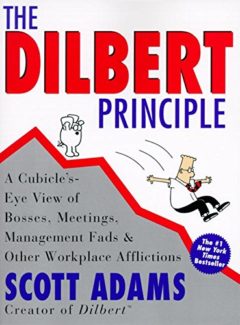 Didn’t You Get the Memo?
Didn’t You Get the Memo?
Author: Scott Adams
I have as yet to experience the work world sans a sardonic Dilbert cartoon pinned up by the overwhelmed helpdesk or a joking reference to the importance of trendy terminology over logical viability. Now as a worker for the federal government, I see Dilbert cartoons flying around in chatty emails and appended to the lunch board, once having my boss ask me to work some Dilbert into a modernization presentation. Wouldn’t Scott Adams be so pleased at the sheer irony!
Deciding that there must be something in these seemingly dry cartoons that keeps the corporate bees buzzing appreciatively and boldly proclaiming the subterranean culturally acceptable reference to workplace discord, I decided to check out one of Adams most well-known opuses: The Dilbert Principle.
A mocking tribute to the Peter’s Principle (i.e. employees will be promoted to their level of incompetence) Scott Adams proposes the Dilbert Principle in which the most ineffective and disruptive workers are moved to the place where they can wreak the least havoc – management! From here, the insanity of management and its devolution into PowerPoint adoration, trendy words and syllogisms, endless performance reviews, team building exercises, and out-and-out stupidity (with some fire-em-all consultants thrown in) starts to make a strange, fevered dream sort of sense. Intersperse some antics from Dogbert and the continual slamming of the knowledgeable in favor of the power suit fast talkers, and you have a sardonic piece of dry humor that has even more bite than bark. While we laugh, it is so evident that most, if not all, of the observations are unpleasantly true.
 Complimented by over 100 Dilbert strips (some of which sadly, repeat, especially towards the end) the book is less of a cohesive complaint and more of a sardonic jaunt around everything that sucks about the work world. The strips are occasionally hilarious, but I find the dry obviousness of Dilbert in cartoon form far less appealing (and effective on the funny bone) than the all-out take-no-prisoners essays which frequently had me chuckling aloud and reading them at night to my amused husband.
Complimented by over 100 Dilbert strips (some of which sadly, repeat, especially towards the end) the book is less of a cohesive complaint and more of a sardonic jaunt around everything that sucks about the work world. The strips are occasionally hilarious, but I find the dry obviousness of Dilbert in cartoon form far less appealing (and effective on the funny bone) than the all-out take-no-prisoners essays which frequently had me chuckling aloud and reading them at night to my amused husband.
Adams ends on a semi-serious, I guess you expected me to do this note, with a brief bare bones “here’s how I would solve the problems” expose. It’s interesting, even viable, but if you’ve gotten this far into the book you’re well acquainted with the idea that the corporate slough will never be drained and beautified.
In the end, The Dilbert Principle is classic Adams; it’s a read that will keep you laughing and shaking your head from the breakdown of what buzz words really mean (aka – modernization and downsizing for
one) to devious ways to look busy (Adams thinks computers are central to the everyday worker’s eight hour lie). It’s not a book that readers will long remember or quote, but it is certainly one that we will enjoy thoroughly.
Frances Carden
Follow my reviews on Twitter at: https://twitter.com/xombie_mistress
Follow my reviews on Facebook at: https://www.facebook.com/FrancesReviews/
[AMAZONPRODUCTS asin=”0887308589″]
- Book Vs Movie: The Shining - April 6, 2020
- Thankful For Great Cozy Mysteries - December 13, 2019
- Cozy Mysteries for a Perfect Fall - October 20, 2019


